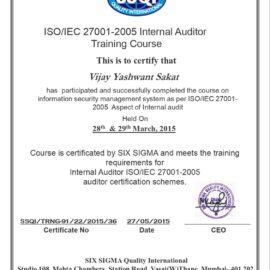Description
What they will gain:
Higher Effectiveness and Efficiency on their Job Excellent
Career Enhancement Opportunity Internationally Recognized Qualification
Photo-identity Card from ASCB(Europe) Ltd. – UK Listing among an International list of Quality Professionals.
Course is Accredited by ASCB(UK). system requirements particular to medical laboratories. The standard was developed by the International Organization for Standardization’s Technical Committee 212 (ISO/TC 212). ISO/TC 212 assigned ISO 15189 to a working group to prepare the standard based on the details of ISO/IEC 17025:1999 General requirements for the competence of testing and calibration laboratories. This working group included provision of advice to users of the laboratory service, the collection of patient samples, the interpretation of test results, acceptable turnaround times, how testing is to be provided in a ISO 15189 Medical laboratories – Particular requirements for quality and competence specifies the quality management medical emergency and the lab’s role in the education and training of health care staff.
ISO 15189:2007 Introduction:
ISO 15189:2007:
ISO 15189:2003 is an international standard developed particularly for the medical laboratories. Though it is based upon ISO/IEC 17025:1999 and ISO 9000:2000, it is a standalone standard for medical laboratories with a title particularly referred to “quality and competence”. Under the International Laboratory Accreditation Cooperation (ILAC) Multilateral Mutual Recognition Arrangement (MLA)accreditation of medical laboratories against ISO 15189 and ISO/IEC 17025 are both acceptable.
The basic idea of the European Union is freedom of movement of people, products and services. This is realized through harmonization of practices, for example in the field of laboratory medicine, a patient wants to be sure that the result of a test can be trusted and is interpreted in the right way during his stay abroad.The primary aims of both Evidence-based Health Care (EBHC) and quality management of health care services are to improve clinical effectiveness and patients’ outcomes. Evidence-based laboratory medicine (EBLM) is an essential tool in the assessment of effectiveness, as high quality systematic clinical research is necessary for investigating the impact of any intervention on clinical outcome.
Implementing ISO 15189 as part of laboratory quality initiatives provides both laboratory and business benefits such as:
· Improved national and global reputation and image of the laboratory.
· Continually improving data quality and laboratory effectiveness.
· Having a basis for most other quality systems related to laboratories, such as Good Laboratory Practices.
· Mutual Recognition Agreement (MRA) amongst various countries test report is acceptable without repetition of analysis.




Reviews
There are no reviews yet.